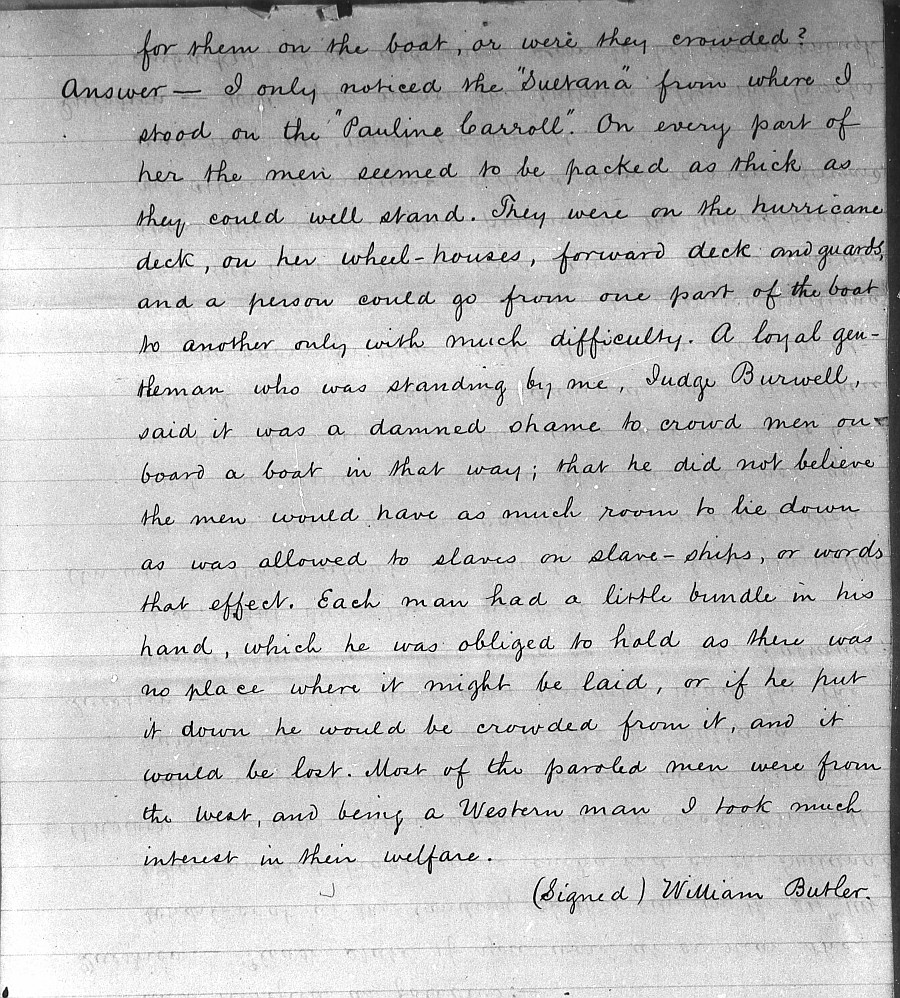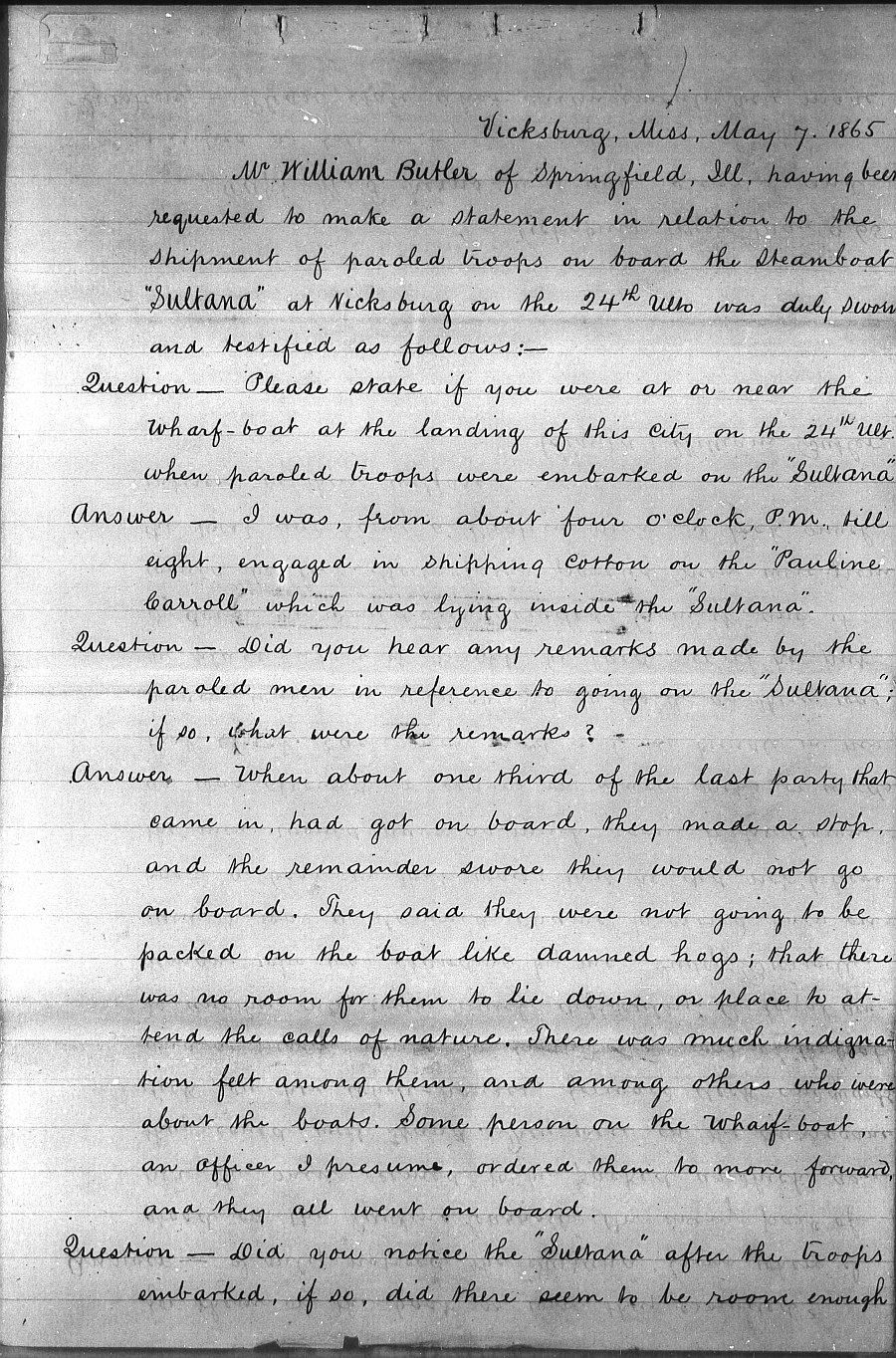|
Early in the morning of April 27, 1865 approximately 1,700 people, both soldiers and civilians, died in the explosion of the steamer Sultana on the Mississippi River. The majority of the victims were former Union prisoners from Cahaba and Andersonville prisons. This disaster was the greatest maritime disaster in United States history.
Information about the disaster and documents found in this collection can be seen in an episode titled "Civil War Sabotage?" of the PBS series History Detectives Special Investigations, which can be viewed at:
http://www.pbs.org/opb/historydetectives/video/2365281276/
The documents in this collection include material from:
Records of the Office of the Quartermaster General, Record Group 92; National Archives and Record Administration
Records of the Adjutant General's Office, 1780's to 1917, Record Group 94; National Archives and Record Administration
Records of the Office of the Judge Advocate General (Army), Record Group 153; National Archives and Records Administration
Records of the U.S. House of Representatives, Record Group 23; National Archives and Records Administration
Records of the Commissary General of Prisoners, Record Group 249; National Archives and Records Administration
Also included are period newspaper articles, a copy of the book "Loss of the Sultana and Reminiscences of Survivors. History of a Disaster Where Over One Thousand Five Hundred Human Beings Were Lost, Most of Them Being Exchanged Prisoners of War on Their Way Home After Privation and Suffering from One to Twenty-Three Months In Cahaba And Andersonville Prisons," by Chester D Berry, and excerpts from The War of the Rebellion: a Compilation of the Official Records of the Union and Confederate Armies dealing with the Sultana Disaster.
History of the Explosion of the Sultana
Following the surrender of General Robert E. Lee's Army of Northern Virginia at Appomattox Court House, Virginia, on April 9, 1865, the United States Government began to demobilize Federal troops and release those held in Confederate custody. Most of those sailing on the Sultana were former prisoners held in Confederate prisons in Cahaba, Alabama, and Andersonville, Georgia. The men were sent to Camp Fisk outside of Vicksburg, Mississippi, where they waited for ships to take them north.
The Quartermaster had the responsibility of transporting soldiers from Confederate prison camps to Federal camps in the north for discharge. The Sultana, owned by the Merchants and People's line, had a government contract to transport troops and freight. The Sultana was contracted in this instance to carry the men up the Mississippi River to Camp Chase, Ohio.
Captain Frederick Speed, assistant adjutant general of volunteers, Department of the Mississippi, volunteered to take the temporary job of commissioner of exchange for prisoners. He coordinated the transfer of the prisoners from Camp Fisk, Mississippi, to the wharf in Vicksburg where the Sultana was docked. Before departing New Orleans in late March, the Sultana's boiler had been repaired. She was declared sound, and proceeded to Vicksburg. Steaming away from Vicksburg, she carried approximately 2,200 passengers on a ship built to carry 376. Figures vary on the number of people onboard and the number who died. The Sultana left Memphis, Tennessee, around 7 p.m. on April 26. Around 2 a.m. on the 27th, the boiler exploded. The ship burned quickly, and more than 1,700 people died from the explosion or by drowning.
Investigations
Quickly reacting to the disaster, Gen. Cadwallader Colden Washburn, commander, district of West Tennessee, issued Special Order 109 on April 27 establishing a panel to investigate the tragedy. The commission took its first testimony at 11:30 that morning.
On April 30, Secretary of War Edwin M. Stanton issued Special Order 195, which ordered Brig. Gen. William Hoffman, Commissary General of Prisoners, to begin a separate investigation. Many of the files from the Washburn Commission are incorporated into the report of this investigation.
On January 9, 1866, Speed's court-martial convened in Vicksburg. He was charged with "neglect of duty to the prejudice of good order and military discipline." Six months later the court-martial found Speed guilty and dismissed him from the Army. Maj. Gen. Thomas J. Wood upheld the findings of the court and sent the file to Secretary of War Stanton, who forwarded the case to Brig. Gen. Joseph Holt, judge advocate general of the U.S. Army.
Holt dismissed the charges, and on September 1, 1866, Speed mustered out of the U.S. Army.
Highlight from this collection include:
Quartermaster vessel file relating to the Sultana. - This file includes the testimony taken before the court of inquiry ordered by Maj. Gen. Cadwallader Washburn; the report of Maj. Gen. William C. Hoffman; and claims from the owners of the Sultana.
Enlisted Branch File - This file includes copies of the reports of the Sultana investigation including the Hoffman report; correspondence with the Committee on Military Affairs (ca. 1908–1910); and information on several Congressional bills for the relief of the survivors.
Appointment, Commission, and Personal file for Capt. George Augustus Williams - Williams was in the 1st U.S. Infantry and served as commissary of musters at Vicksburg. General Napoleon Jackson Tecumseh Dana, assistant quartermaster, appointed him to supervise the exchange of prisoners at Camp Fisk, where the prisoners were held between their release from Cahaba and Andersonville and their passage on the Sultana.
The proceedings and report of the court-martial of Capt. Frederick Speed.
List of Federal prisoners who survived the Sultana.
List of survivors who were sent to the hospital in Vicksburg, MS, on April 29, 1865.
List of those lost onboard the Sultana.
H.R. 3296: A bill to do justice to the survivors of the shipwreck Sultana (January 6, 1896)
List of commissioned officers
List of Indiana soldiers
List of Kentucky soldiers
List of Michigan soldiers
List of Ohio soldiers
List of Tennessee soldiers
List of West Virginia soldiers
Two lists of paroled prisoners of war belonging to different regiments wrecked on the steamer Sultana, April 27, 1865
List of survivors from the steamer Sultana near Memphis, TN, April 27, 1865, consisting of paroled prisoners en route to Camp Chase, OH
List of Sultana survivors
List of prisoners of war who perished onboard the Sultana
"The Loss of the Sultana and Reminiscences of Survivors," by Chester D Berry
This 430 page book was published in 1892. In his book Berry collected stories first hand from survivors of the disasters including:
Simeon D. Chelf
"About two o'clock in the morning of April the 27t the boiler of the boat exploded. When this took place I was sleeping on the bow of the boat with my head against one of the cable posts. Seth H. Davenport was at my left and on his left was a man who was killed. A piece of iron glanced my head, and in the excitement I thought the rebels had fired a battery on us. . . . The front part of the cabin and the pilot house were blown to atoms and the stairway damaged so it could not be traveled. The boat was crowded with soldiers from boiler deck to hurricane deck. a man stood on the lower part of the stairway and hallooed, "the boat is sinking!" The men rushed to the bow of the boat and jumped overboard as fast as they could, tumbling into the river upon each other and going down into the deep by the hundreds." (pages 87-88)
P. L. Horn
"At the time of the explosion McKelvy and I were lying together asleep, and it is a matter of wonder to me how I escaped when he was so seriously injured. . . . How far or how high I was blown into the air I do not know, but I remember that my feet first struck, water and with the exception of being slightly hurt on my left side I suffered but little from the shock. . . . It is my opinion that the explosion was caused by a torpedo having been placed in the coal by the Confederates at the last coaling station. One of the boilers of the Sultana had just been repaired at Vicksburg. Many of the men who lost their lives were soldiers who had been prisoners for many months, some even for twenty months." (page 23)
W. P. Madden
"On the morning of the 27th of April, 1865, at about two o'clock, I was asleep dreaming of home and loved ones, of whom I had not heard a word for about ten long months that I had spent in Andersonville prison. Suddenly I was awakened by an upheaval and crashing of timbers. I attempted to arise from my recumbent position and as I threw up my hands to explore my surroundings I got them severely burned, and was horrified to find that my efforts to extricate myself were fruitless and the heat was stifling. I could not tell where I was, but could hear the groans of the wounded and the shrieks of the women mingling with the crackling noise of the flames and the hissing of the white steam that enveloped the boat for a time. . . . I crawled out as black and begrimed as a coal digger. I then discovered that I had been under a piece of boiler iron about a half of a circle, both ends being blocked with timbers and debris thrown hither and thither by the force of the explosion." (pages 229-230)
Newspaper Articles
80 pages of newspaper articles dating from April 29, 1865 to April 27, 1916, covering the Sultana Disaster. Most of the articles are from newspapers published in Ohio, the planned destination of many of the soldiers onboard the Sultana. The pages are complete newspaper sheets. The articles are alongside the major news of the day.
The early newspapers carry stories about major events occurring around the time of the Sultana Disaster including President Lincoln's Funeral, the capture of John Wilkes Booth, the capture of Jefferson Davis, and the surrender of Confederate General Johnston which many newspapers called the last act of the Civil War.
Testimony of William Butler, a cook aboard the SS Sultana, given to the Washburn Committee.


|